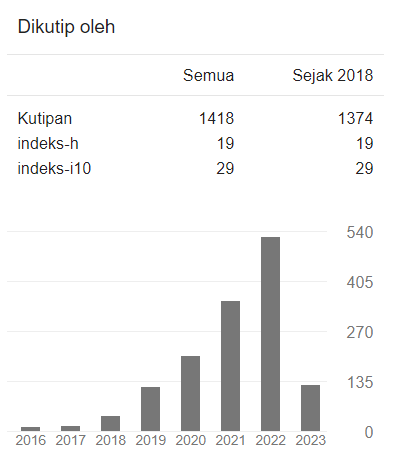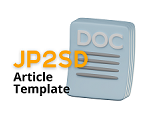MENUMBUHKAN KEDISIPLINAN SISWA MELALUI STRATEGI MANAJEMEN INTERVENSI
DOI:
https://doi.org/10.22219/jp2sd.v7i1.8632Keywords:
Manajemen Intervensi Kelas, Kedisiplinan SiswaAbstract
Penelitian ini bertujuan untuk mendeskripsikan optimalisasi manajemenintervensi terhadap perilaku buruk siswa di sekolah dasar. Metode yang digunakan melalui
kajian literatur berdasarkan dokumen. Hasil kajian menunjukkan bahwa optimalisasi
manajemen kelas memfungsikan seluruh komponen, meliputi sekolah dan orangtua sebagai
komunitas moral yang berbagi tanggung jawab dan peran untuk mencegah dan mengatasi
perilaku buruk siswa yang diwujudkan berupa kedisiplinan siswa pada proses
pembelajaran. Optimalisasi kolaborasi orangtua dapat menciptakan komunikasi yang
terapdu dengan pendidikan di sekolah untuk menghindari kontinuitas perilaku. Kesiapan
seorang guru dalam penguasaan manajemen intervensi menjadi hal penting sebagai bentuk
dukungan guru terhadap penindakan perilaku siswa dengan tepat sasaran dan
menumbuhkan sikap disiplin siswa pada saat pembelajaran berlangsung. Integrasi nilai
dalam kurikulum sekolah diperlukan sebagai upaya penanggulangan perilaku buruk agar
siswa memiliki pribadi yang berkarakter baik
Downloads
References
Agboola, A., & Tsai, K. (2012). Bring
Character Education Into
Classroom. European Journal of
Educational Research. Vol. 1, No.
, 163-170
Akbar, S., Samawi, A., Arafik, A., &
Hidayah, L. (2015). Pendidikan
Karakter: Best Practice. Malang:
Universitas Negeri Malang
Arends, R. (2013). Learning to Teach.
New York: Mc Graw-Hill
Companies, Inc
Jones, Ken. (2006). Professional ethics
and the teacher: towards a general
teaching council. New York:
Routledge
Corcoran, ed. (2014). Psychology in
Education: Critical TheoryPractice. Rotterdam: Sense
Publishers
Djamarah, S. (2010). Guru dan Anak
Didik Dalam Interaksi Edukatif.
Jakarta: Rineka Cipta
Dufour, B., & Curtis, W. (2011).
Studying Education: An
Introduction to The Key
Disciplines in Education Studies.
New York: Mc Graw-Hill
Companies, Inc
Flanagan, C., Cumsile, P., Gill, S., &
Gallay, L, (2007), “School and
Community Climates and Civic
Commitments: Pattern For Ethnic
Minority and Majority Student”,
Journal of Educational
Psychology, 99, 421-431
Gordon, A., & Browne, K. (2011).
Beginnings and Beyond:
Foundations in Early Childhood
Education. California:
Wandsworth Cengage Learning
Harmon, D., & Jones, T. (2005).
Elementary Education. California:
ABC-CLIO, Inc
Jacobsen, D., Eggen, P., Kauchak, D.
(2009). Methods For Teaching.
New Jersey: Pearson Education,
Inc
Jones, V., & Jones, L. (1986).
Comprehensive Classroom
Management (7th ed). Boston:
Allyn & Bacon
Moreno, R. (2010). Educational
Psychology. New Jersey: John
Wiley & Sons, Inc
Muijs, D., & Reynolds, D. (2008).
Effective Teaching: Evidence and
Practice. London: Sage
Publications
Munandar, U. (2012). Pengembangan
Kreativitas Anak Berbakat.
Jakarta: Rineka Cipta
Nucci, L., & Narvaez, D. (2014).
Handbook of Moral and
Character Education. New York:
Routledge
Santrock, J. (2011). Educational
Psychology. New York: Mc
Graw-Hill Companies, Inc
Semke, C., & Sheridan, S. (2012).
Family-School Connection in
Rural Educational Settings: A
Systematic Review of thr
Empirical Literature. School
Community Journal. Vol. 22, No.
, 21-48
Downloads
Published
Issue
Section
License
Authors who publish with Jurnal Pemikiran dan Pengembangan Sekolah Dasar (JP2SD) agree to the following terms:
- For all articles published in Jurnal Pemikiran dan Pengembangan Sekolah Dasar (JP2SD), copyright is retained by the authors. Authors give permission to the publisher to announce the work with conditions. When the manuscript is accepted for publication, the authors agree to automatic transfer of the publishing right to the publisher.
- Authors retain copyright and grant the journal right of first publication with the work simultaneously licensed under a Creative Commons Attribution-ShareAlike 4.0 International License that allows others to share the work with an acknowledgment of the work's authorship and initial publication in this journal.
- Authors are able to enter into separate, additional contractual arrangements for the non-exclusive distribution of the journal's published version of the work (e.g., post it to an institutional repository or publish it in a book), with an acknowledgment of its initial publication in this journal.
- Authors are permitted and encouraged to post their work online (e.g., in institutional repositories or on their website) prior to and during the submission process, as it can lead to productive exchanges, as well as earlier and greater citation of published work (See The Effect of Open Access).

This work is licensed under a Creative Commons Attribution-ShareAlike 4.0 International License.


















